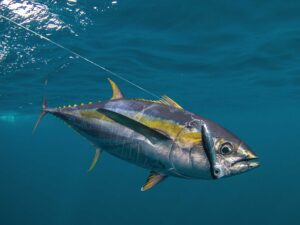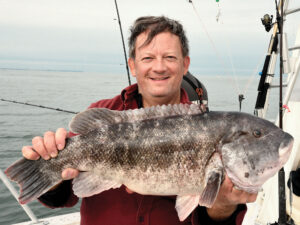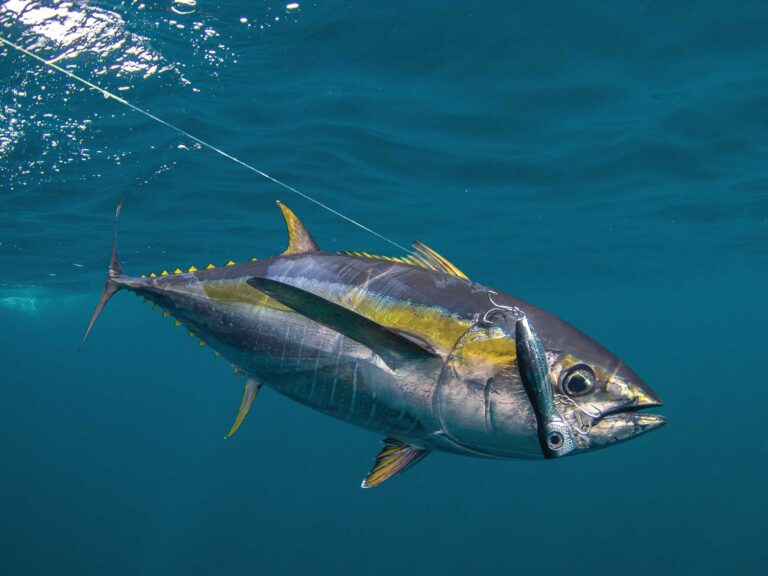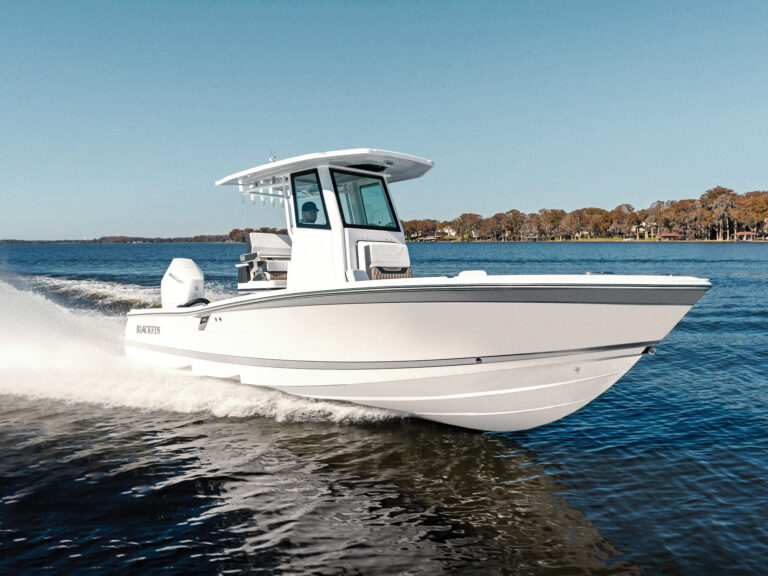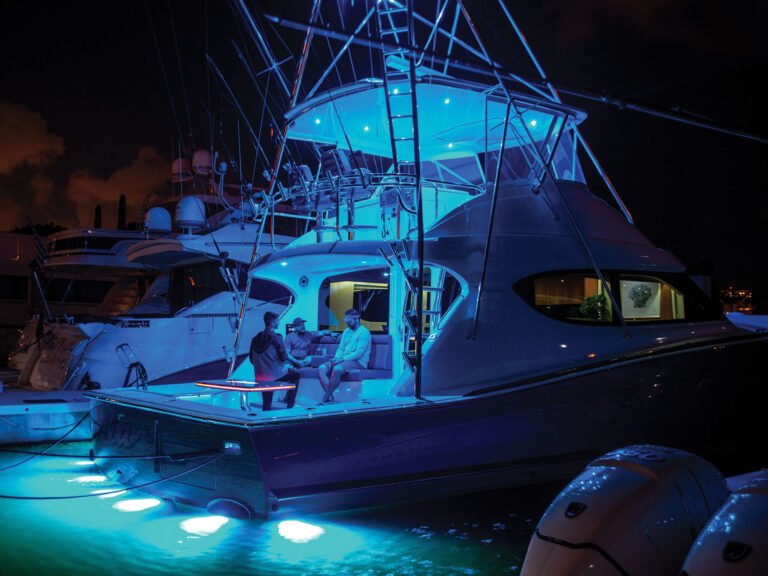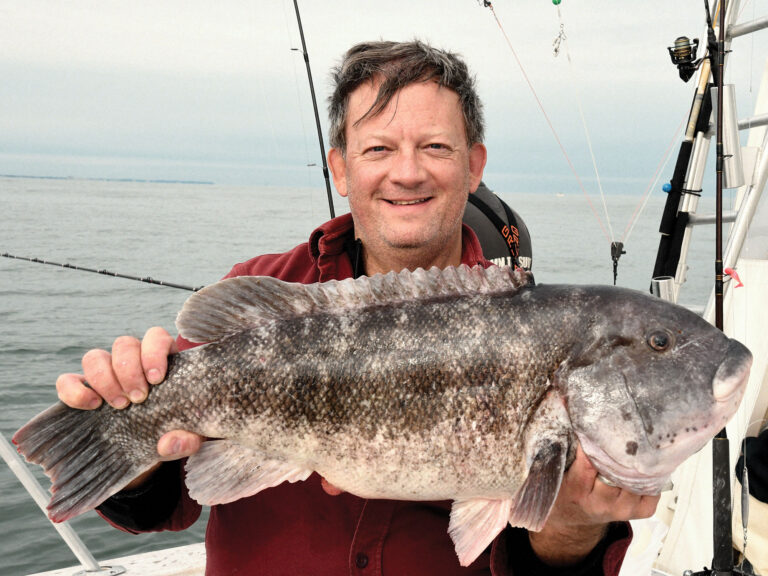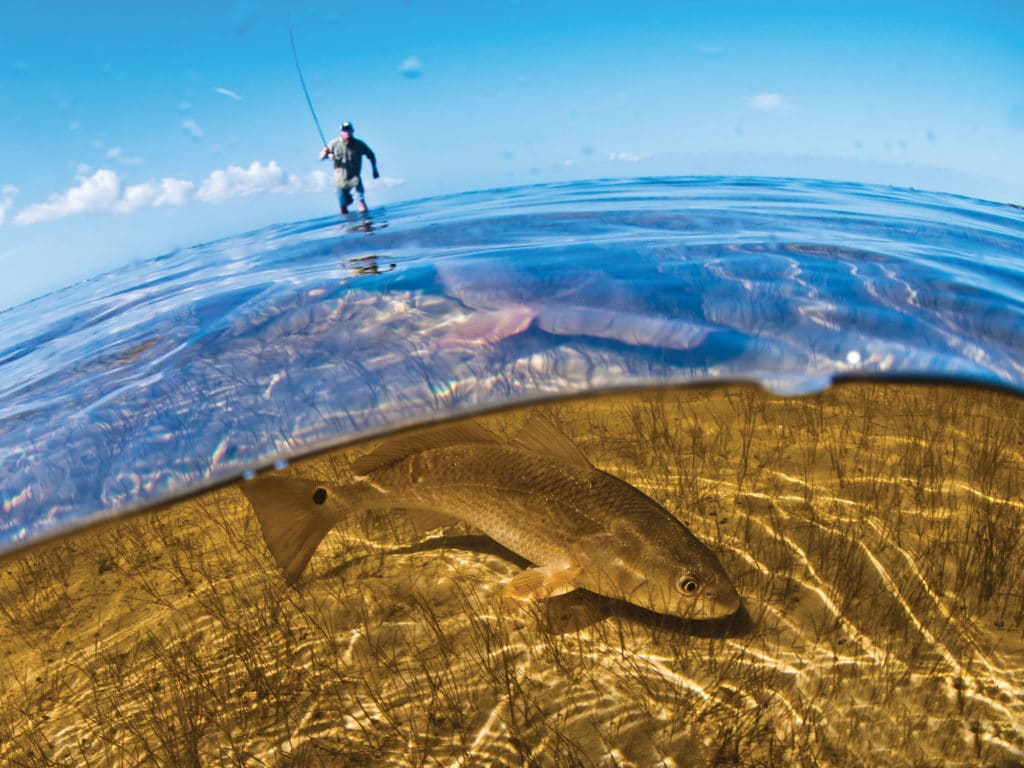
A redfish is like a bull in a Texas rodeo. They are rough and rowdy, and they’ll eat just about anything that won’t eat them first. They can be caught in mere inches of gin-clear water, and if that doesn’t work, they can be found around offshore oil and gas platforms in 30 to 50 feet of water. Anglers can target them with a tiny fly-fished popping bug in the morning calm and then toss big topwater lures later the same day along shorelines.
Depending on the day, redfish can act like a carp, bonefish or another fish entirely. Soaking dead bait on the bottom is a proven tactic, but so is sight-fishing with artificials. Redfish are strong, tough and a hoot to catch, which explains why they are so popular among anglers in Texas.
Wade-Fishing Is a Texas Tradition
Three of us bailed out of Capt. Charlie Paradoski’s center-console boat along a flat called Green’s Bayou located off Matagorda Island in the middle Texas coast.
“We probably need to spread out and cover some water, look for bait, and be on point for tailing or waking reds,” Paradoski said. “If you get into a school of reds, wave everybody into the action.”
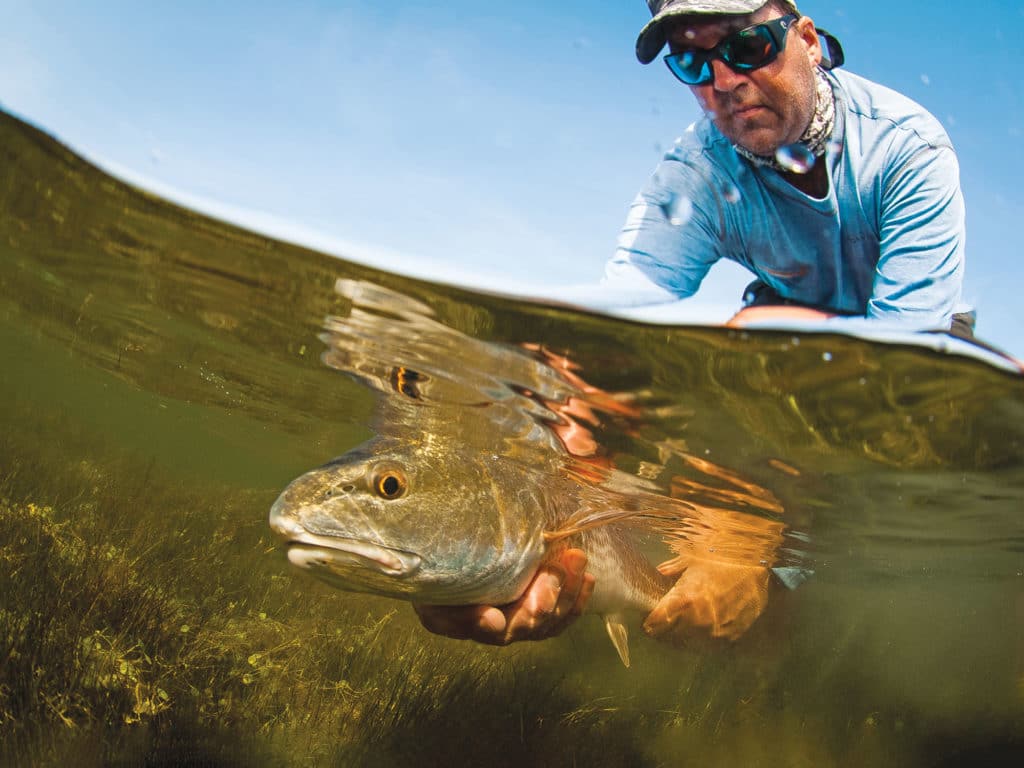
The water was as clear as mountain air, and the sun was just beginning to shine as I glanced over my shoulder. Just like clockwork, there was Paradoski hooked up, rod bowed over and waving us into a pod of reds he had waded into. We were all slinging topwater lures. One of the best and most productive over the decades has been a chrome-and-blue Super Spook Jr. It looks exactly like a finger mullet on the surface and has a side-to-side movement that drives reds crazy. Paradoski reached over and latched on to about a 25-inch red, and sure enough, I could clearly see the chrome-and-blue lure dangling from the mouth of the satisfying catch.
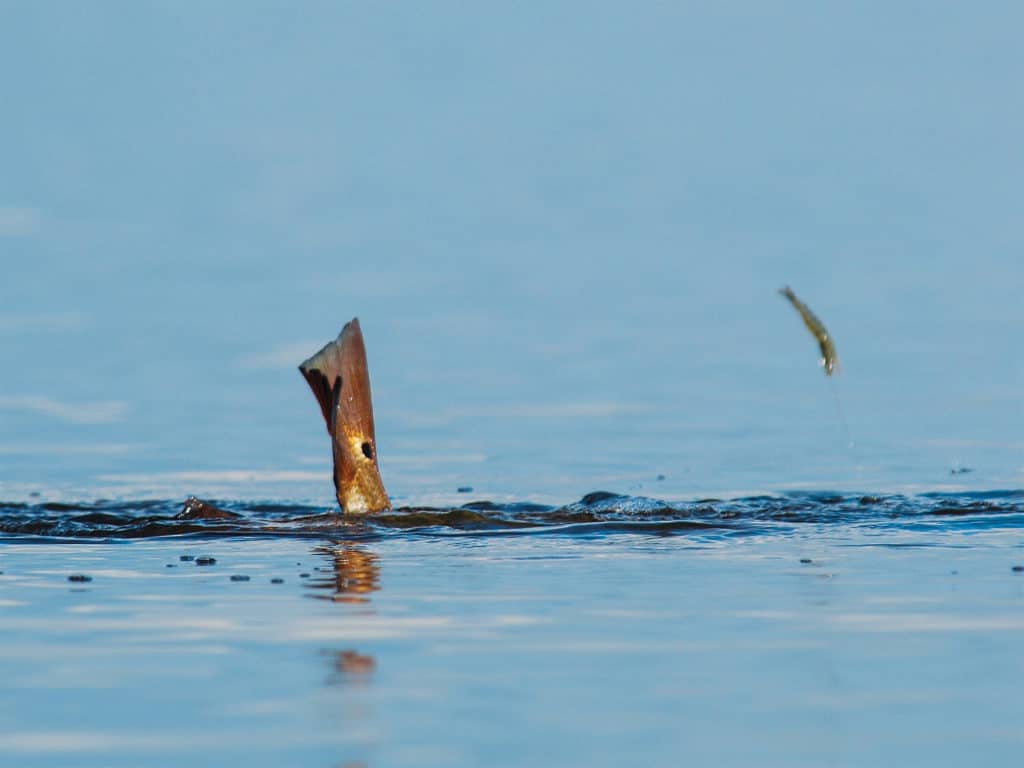
Diverse Feeders
Redfish will eat just about anything. While cleaning a bull red years ago, I found a spent shotgun shell in its stomach. That’s why fishing specifically for reds is so much fun along the Texas coast, which spans more than 350 miles. Along all that shoreline are wide-open bays, lagoons, islands and estuarine lakes. The thousands of sand pockets and grassy flats are perfect habitat.
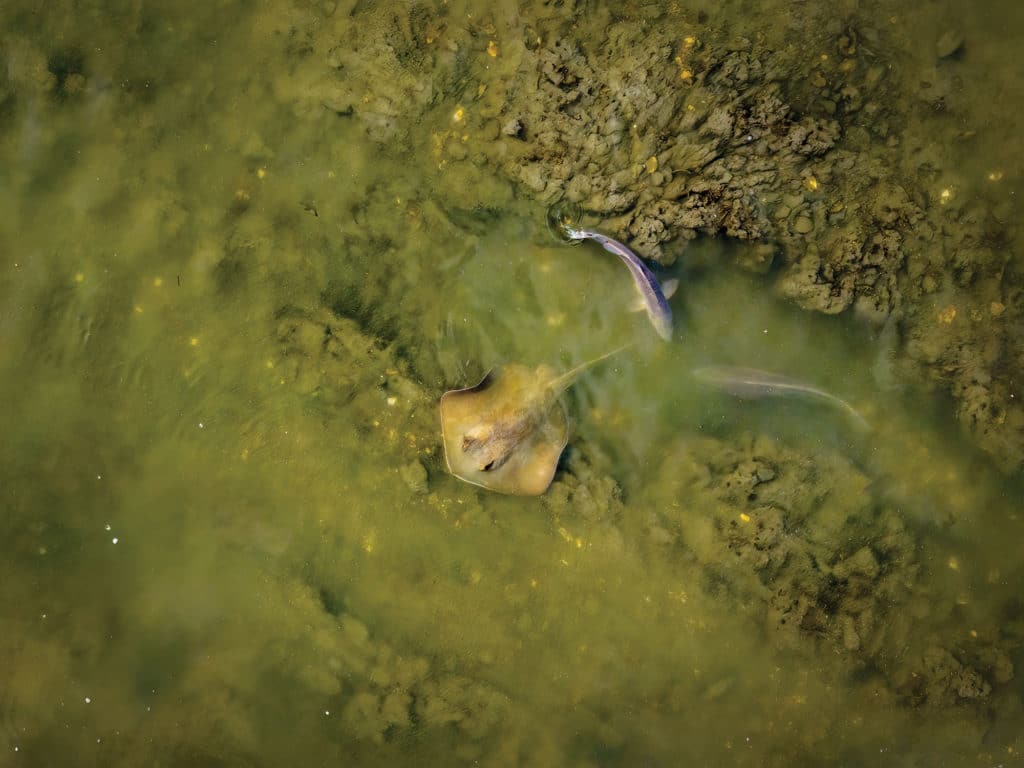
During late fall, there is a strong migration of reds from the bays and into the Gulf of Mexico. Conversely, there’s also the spring run of reds. Red drum dependably make a pit stop along the jetties and gorge on shrimp, crabs and mullet riding the spring tides into the bays. Guides will take their customers out to the mouths of the jetties to tap into some excellent topwater action on bull reds.
“Some of the best fishing is during the spring at the mouth of the Port O’Connor jetties. As the water flows into West Matagorda Bay, the bull reds will be churning up the surface and feeding heavily on a variety of baits. When everything is right, the gulls, frigate birds and pelicans will be right on top of the surface-busting reds. It’s a wild day of sight-casting to big reds. It’s mostly catch-photo-and-release fishing.”
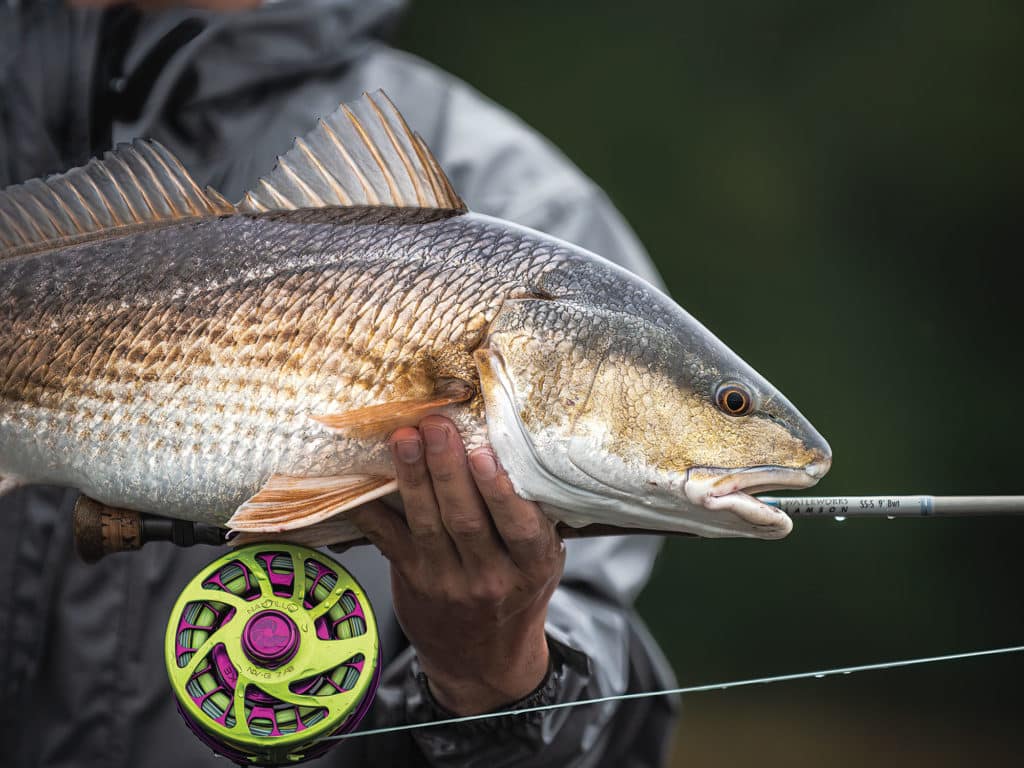
Not All Those Who Wander Are Lost
The great thing about chasing reds is they are user-friendly fish. Throughout the summer and fall they can be caught on the flats in shallow water. Some of the best action takes place on the Laguna Madre down in South Texas. It’s a shallow, hypersaline lagoon roughly 120 miles long. The lagoon’s many grassy flats and clear-water shorelines provide legendary sight-fishing for reds.
One of the favored tactics on the Laguna is to ease over the flats in a poling skiff. One angler is on the poling platform and another is on the bow. Typically, the person on the elevated platform will push the boat along and look for reds feeding on shad, shrimp, worms and crabs. The tactic is classic spot-and-stalk fishing. Anglers might get 25 to 30 shots at reds during a day on the flats. It’s the perfect fly-fishing adventure. You see the target fish, get the line in the air and, when everything is right, drop a fly within a few feet of the red. Sight-fishing is an addictive way of fishing, and can be done with spinning or baitcasting gear as well.
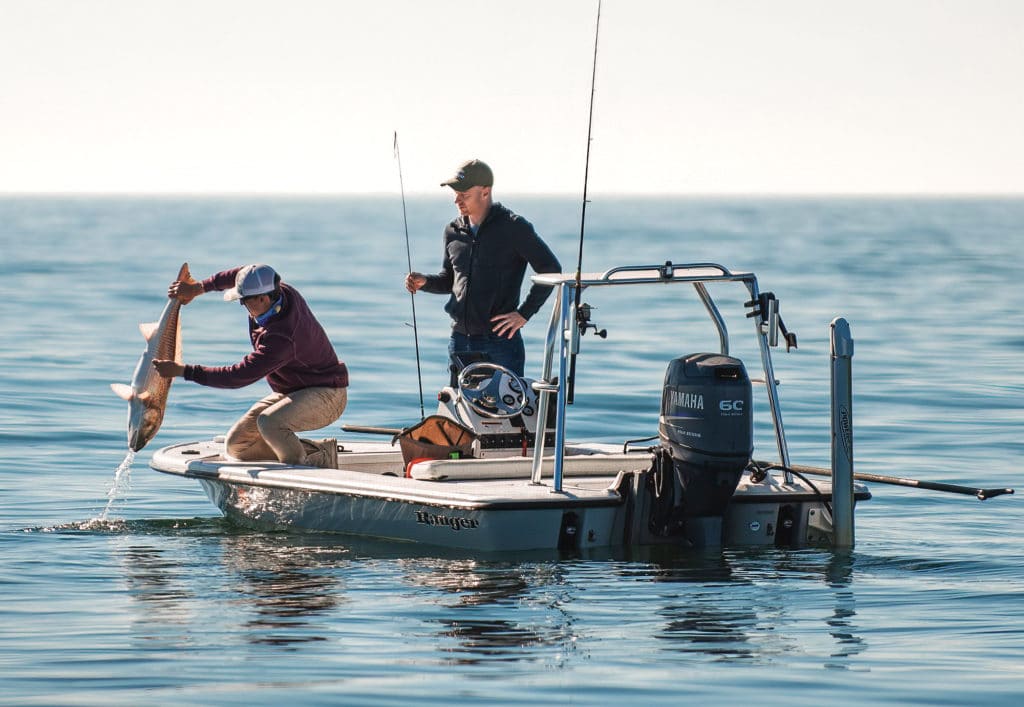
The Land Cut
Guide Steve Ellis has been fishing on the Laguna Madre for decades. One of his best tactics is to make the run from Port Mansfield to the land cut, which is about 25 miles long. It’s around 100 to 150 feet wide, with a shoreline covered with aquatic vegetation and sand and mud potholes.
“I especially like fishing the land cut because it’s some of the best clear-water fishing on the Laguna Madre,” Ellis says. “I’ve got two towers on my boat, which allows the anglers to see fish like tailing reds in the clear water. It’s classic topwater-fishing. But tying on a weedless 1/4-ounce gold spoon is a proven tactic.”
Reds are definitely not shy about pouncing on a topwater lure. And they will do it with gusto. When you set the hook, they don’t lollygag around either. They head out like a freight train. One of the newest topwater lures to come along in years is the D.O.A. PT-7. This soft-plastic lure comes rigged with a double hook pinned up against the side of the lure. Reds love to ambush mullet in grassy areas, and that is where the PT-7 works like a charm. It can be fished over or in the grass and will draw some pretty flashy blowups.
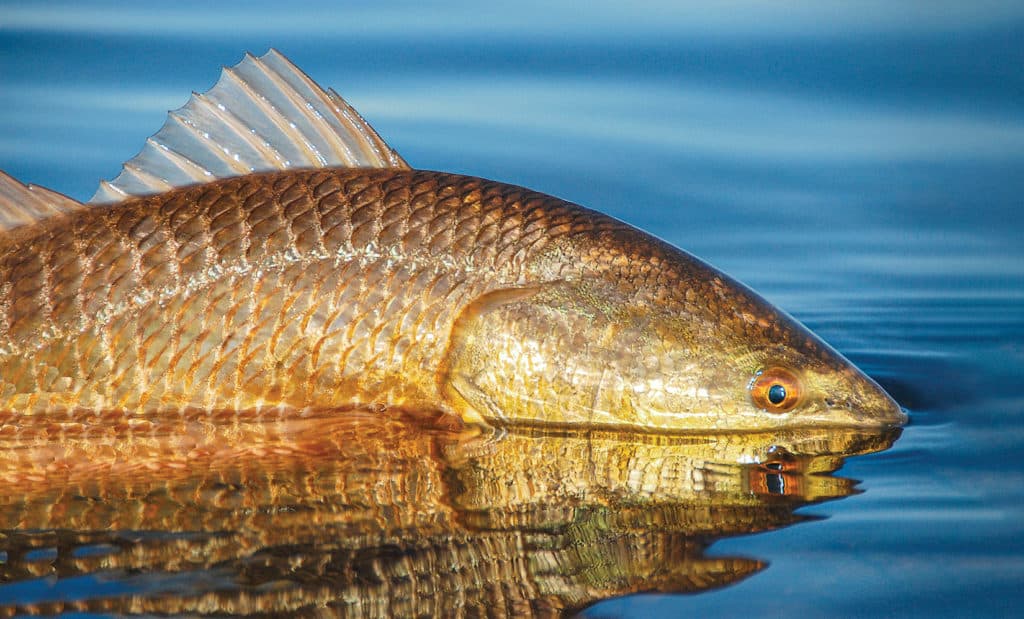
Not-So-Secret Hotspots
One of the best areas to consistently find redfish is along the Intracoastal Waterway, which goes from one end of the Texas coast to the other. When I was working as a fishing guide, it was at the top of my go-to list for finding and catching reds. Quite often, the reds would be tailing while feeding on worms and crabs in about a foot of water.
The most consistent place to find reds just about year-round is along the jetties. Two of the best are in Sabine and Port O’Connor. When a moving tide comes in or goes out, slot and bull reds will stack up and feed heavily on mullet, shrimp and crabs. Here, what a lot of anglers do is bait up with a fresh dead mullet chunk. Mullet are easily caught in a cast net. The mullet chunks are fished on 3/0 Kahle hooks on a Carolina rig. When the red picks up the bait, it doesn’t feel the tug of the weight.
At the Port O’Connor jetties, the trick is to hold in place with a trolling motor and chum the water with diced Spanish sardines. The best water depths are anywhere from 15 to 30 feet deep.
Rockport, located between Port O’Connor and the upper end of the Laguna Madre, is where the guides will fish channels and flats adjacent to the many islands. A captain will usually have a good supply of pinfish and mullet. Once the guide positions the boat on a likely location, he chops up small chunks of fresh dead chum and fan-casts them out. Next, about six to seven rods are baited up, cast out, and placed in rod holders. It doesn’t take long to start getting bites.
Drift-Fishing the Flats
One of the more popular options on the Laguna Madre is to set up drifts over the miles of grass flats. A drift sock slows the boat’s progress and helps it stay on a specific area. The best lures are soft baits from makers such as MirrOlure, D.O.A., Berkley Gulp! and Z-Man. Rig them on a 1/8- or 1/16-ounce jig head.
One thing is certain: There is definitely no shortage of reds along the Texas coast. These hard-fighting and tasty fish can be caught just about anywhere you find salt water.
Read Next: Targeting Redfish in Louisiana
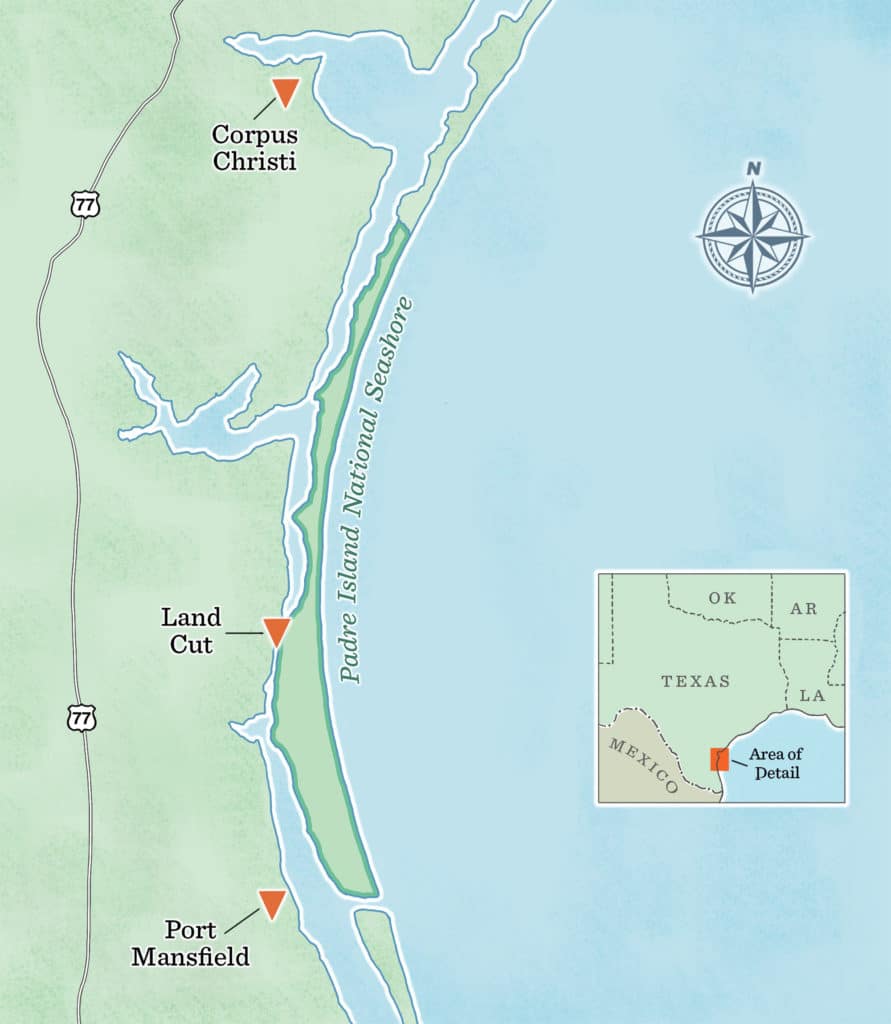
Hot Spot: The Land Cut
The “land cut” waterway, which connects the Upper and Lower Laguna Madre, can best be described as remote. The cut is roughly 25 miles long and located in the middle of nowhere, but it has some of the best fishing along the lower Texas coast.
Laguna Madre is really two bays divided by miles of mud and sand flats. The northern bay, about 40 miles long, is known as the Upper Laguna Madre, and the area south is the Lower Laguna Madre. Upon completion of the Gulf Intracoastal Waterway in 1949, the upper and lower portions were permanently joined by what is known today as the land cut.
In addition to serving as a navigable channel for boat and barge traffic, the area is fantastic for redfish and speckled trout. The big advantage to fishing the cut is that you’re protected from the wind—it offers clear-water flats along the shoreline, and sight-casting to reds and plugging for trout are favorite tactics.
To reach the south end of the cut, you have to launch your boat at Port Mansfield, followed by a 20-mile run. From the north end, put in at Bluff’s Landing Marina in Corpus Christi. From there, it’s about 33 miles to the cut.
SWS Planner: Texas Gulf Coast Redfish Action
- When: Summer and fall
- Who: The following guides specialize in Texas redfishing:
- Middle Texas Coast: Capt. Charlie Paradoski, charlieparadoski.com, 713-725-2401
- Lower Laguna Madre: Capt. Eric Glass, @captainericg, 956-434-1422
- Galveston Bay: Capt. Jim West, 409-996-3054
- Sabine Lake: Capt. Jerry Norris, 409-718-8782, sabinefishing.com
SWS Tackle Box
- Rod: Sarge Custom Rods, such as Ma Deuce, Smooth Dog and Boss
- Reel: Lew’s Speed Spool
- Line: 8- to 20-pound Fins Windtamer braided line
- Leader: 5-foot section of 17-pound-test Berkley Vanish fluorocarbon leader
- Topwaters: Super Spook Jr., D.O.A. PT-7, MirrOlure C-Eye Skin Series twitchbait
- Soft Baits: D.O.A. C.A.L. Shad Tail, Z-Man DieZel MinnowZ, MirrOlure Soft Shad



